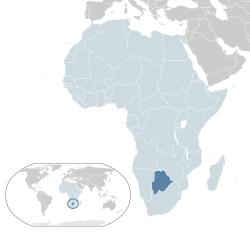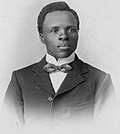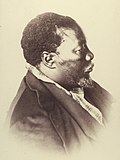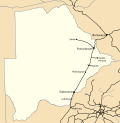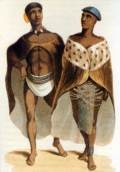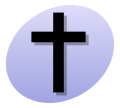Portal:Botswana
Intro
Botswana, officially the Republic of Botswana, is a landlocked country in Southern Africa. Botswana is topographically flat, with approximately 70% of its territory being a part of the Kalahari Desert. It is bordered by South Africa to the south and southeast, Namibia to the west and north, Zambia to the north, and Zimbabwe to the northeast. With a population of slightly over 2.4 million people and a comparable land area to France, Botswana is one of the most sparsely populated countries in the world. It is essentially the nation-state of the Tswana people, who constitute nearly 80% of the population. The Tswana ethnic group are descended mainly from Bantu-speaking peoples who migrated into southern Africa, including modern Botswana, in several waves before AD 600. In 1885, the British colonised the area and declared a protectorate named Bechuanaland. As part of the decolonisation of Africa, Bechuanaland became an independent Commonwealth republic under its current name on 30 September 1966. Since then, it has been a parliamentary republic with a consistent record of uninterrupted democratic elections, though dominated by the Botswana Democratic Party until 2024. As of 2024[update], Botswana is the least corrupt country in mainland Africa according to the Corruption Perceptions Index published by Transparency International. Botswana's economy has generally experienced stable growth since independence. It is dominated by tourism and mining; Botswana produces more diamonds than any other country. Its gross national income per capita (purchasing power parity) of about $20,158 as of 2024[update] (by some estimates the fourth-largest in Africa) gives the country a relatively high standard of living and the second-highest Human Development Index of continental Sub-Saharan Africa, after South Africa. Despite this, Botswana continues to grapple with high unemployment rates. Botswana is a member of the Southern African Customs Union, the Southern African Development Community, the Commonwealth of Nations and the United Nations. (Full article...)
Selected article -The Gods Must Be Crazy is a 1980 comedy film written, produced, edited and directed by Jamie Uys. An international co-production of South Africa and Botswana, it is the first film in The Gods Must Be Crazy series. Set in Southern Africa, the film stars Namibian San farmer Nǃxau ǂToma as Xi, a hunter-gatherer of the Kalahari Desert whose tribe discovers a glass Coca-Cola bottle dropped from an aeroplane, and believe it to be a gift from their gods. When Xi sets out to return the bottle to the gods, his journey becomes intertwined with that of a biologist (Marius Weyers), a newly hired village school teacher (Sandra Prinsloo), and a band of guerrilla terrorists. The Gods Must Be Crazy was released in South Africa on 10 September 1980 by Ster-Kinekor, and broke several box office records in the country, becoming the most financially successful South African film ever produced at the time. The film was a commercial and critical success in most other countries, but took longer to find success in the United States, where it was eventually re-released in 1984 by 20th Century Fox, with its original Afrikaans dialogue being dubbed into English. Despite its success, the film attracted criticism for its depiction of race and perceived ignorance of discrimination and apartheid in South Africa. (Full article...) Did you know - ... that Molly Clutton-Brock treated the spines of African babies until she was deported by the government of Rhodesia? This is a good article, A-class article, featured list, or featured article, one of Wikipedia’s best work.
The hippopotamus (Hippopotamus amphibius; /ˌhɪpəˈpɒtəməs/; pl.: hippopotamuses), often shortened to hippo (pl.: hippos), further qualified as the common hippopotamus, Nile hippopotamus and river hippopotamus, is a large semiaquatic mammal native to sub-Saharan Africa. It is one of only two extant species in the family Hippopotamidae, the other being the pygmy hippopotamus (Choeropsis liberiensis or Hexaprotodon liberiensis). Its name comes from the Ancient Greek for "river horse" (ἱπποπόταμος). After elephants and rhinoceroses, the hippopotamus is the next largest land mammal. It is also the largest extant land artiodactyl. Despite their physical resemblance to pigs and other terrestrial even-toed ungulates, the closest living relatives of the hippopotamids are cetaceans (whales, dolphins, porpoises, etc.), from which they diverged about 55 million years ago. Hippos are recognisable for their barrel-shaped torsos, wide-opening mouths with large canine tusks, nearly hairless bodies, short legs, and large size: adults average 1,500 kg (3,300 lb) for bulls (males) and 1,300 kg (2,900 lb) for cows (females). (Full article...) General images -The following are images from various Botswana-related articles on Wikipedia.
Related portalsOther South African countriesReligion in BotswanaBotswana-related articlesCategoriesAssociated WikimediaThe following Wikimedia Foundation sister projects provide more on this subject:
| |||||||||||||||||


